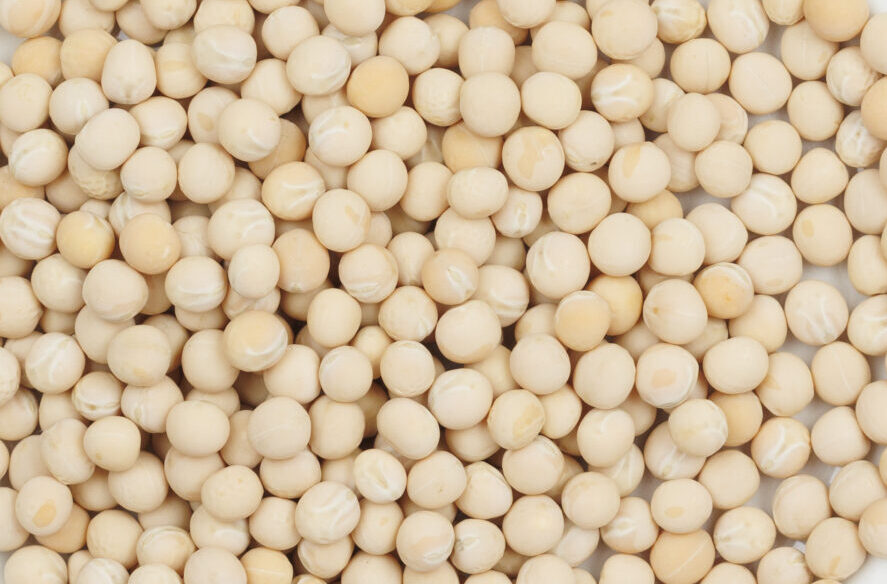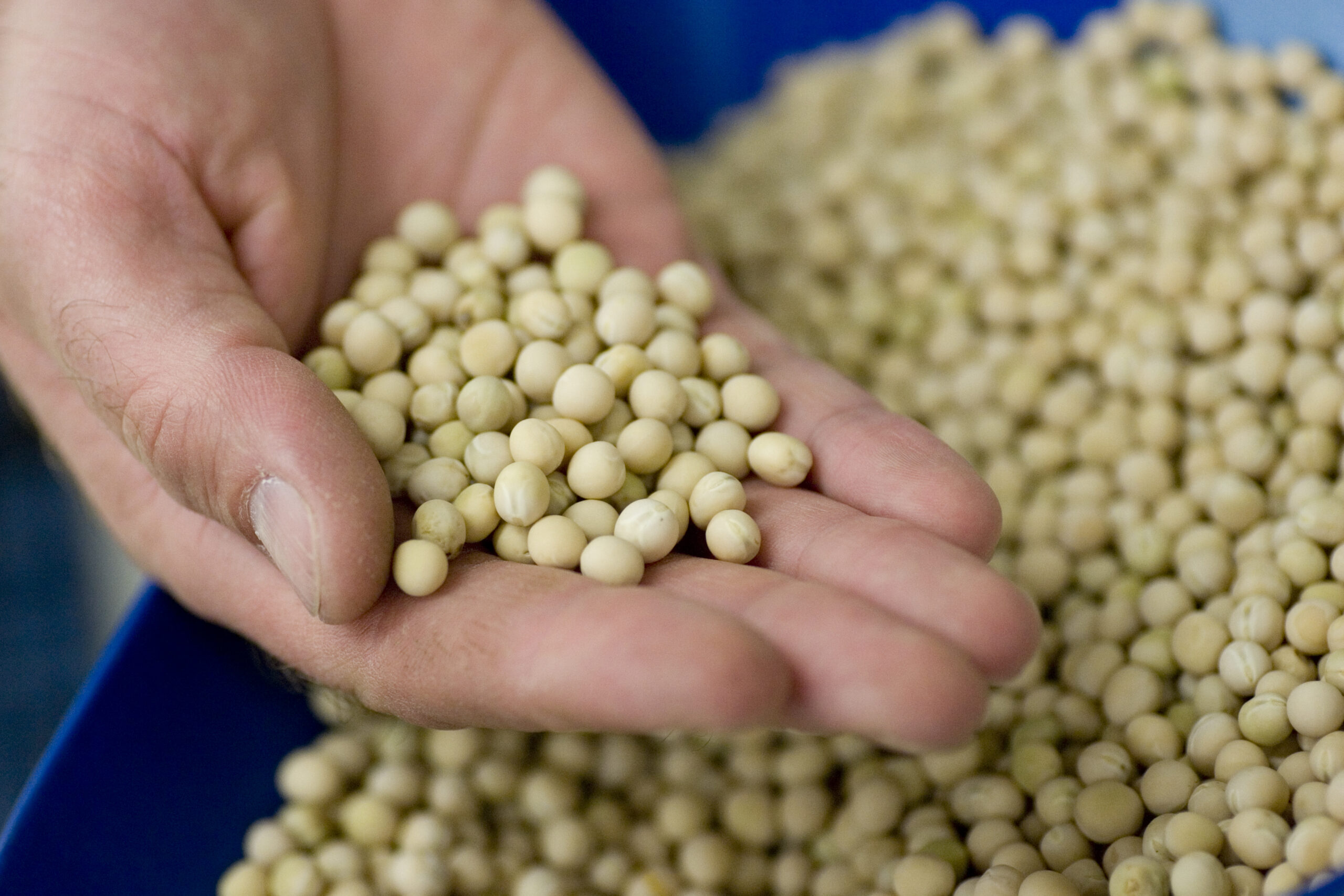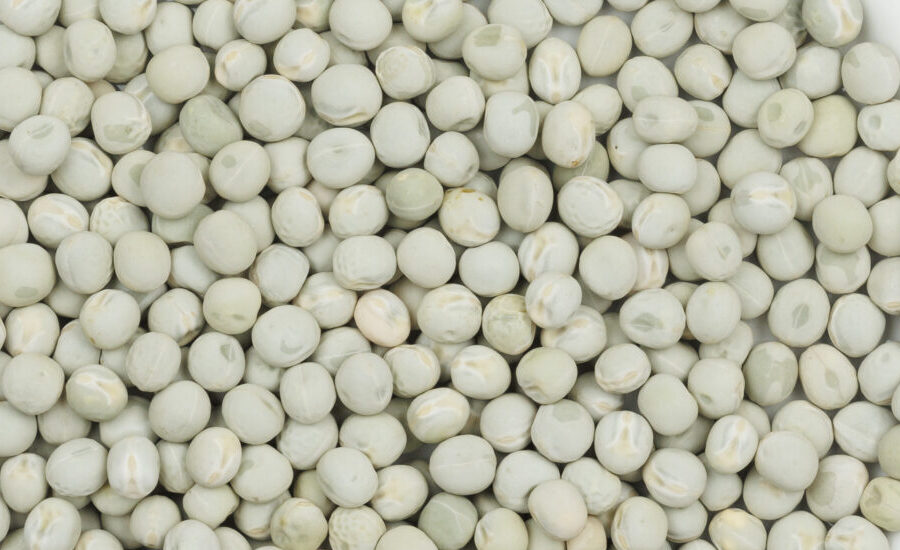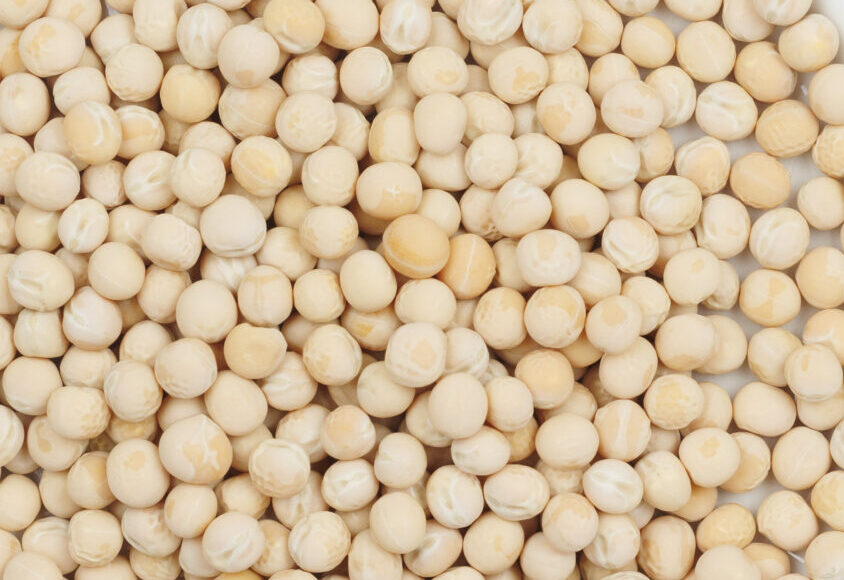Market Class: Yellow Pea
Year Released to Seed Growers: 2022
Sub-licensed Outside of SK: SeedNet
International Distribution Rights: No
Breeder: Dr. Tom Warkentin, Crop Development Centre, University of Saskatchewan, Saskatoon, SK
Plant Breeders Rights: PBR’91
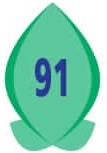
Description
CDC Citrine (5296-2) is a mid-maturing very high-yielding yellow pea that was one of the 6 highest yielding pea varieties in the south and the highest yielding variety in the north after 6 years of testing in the Co-op and regional trials in Saskatchewan. Compared to the check variety CDC Amarillo, it yielded 108% in the south and 110% in the north (Table 1). It has very good standability; similar to CDC Amarillo and CDC Spectrum and medium-long vine length. Protein is moderate (0.3% higher than CDC Amarillo). It has slightly improved resistance to mycosphaerella blight and improved resistance to fusarium root rot vs. CDC Spectrum, CDC Lewochko or CDC Inca. It has good seed characteristics and is rated good for resistance to seed coat breakage, dimpling and greenness.
Statistical analysis of 8 years of long-term RVT data ranked CDC Citrine 4th from the top for yield in the south and 3rd in the north among 16 historical and new yellow pea varieties (Figure 1).
Strengths
- High yield in both north & south geographies
- Good seed characteristic package – rated good for:
- Resistance to seed coat breakage;
- Resistance to dimpling;
- Greenness (less green colouration) – better than CDC Inca or CDC Spectrum
- Round seed shape
- Good lodging resistance; similar to CDC Spectrum and CDC Amarillo, better than CDC Inca or CDC Meadow
- Rated moderately resistant to Fusarium root rot – similar to CDC Amarillo, better than CDC Spectrum
- Improved resistance to mycosphaerella blight – rated slightly better than CDC Amarillo
- Powdery mildew resistance
Neutral
- Medium maturity
- Medium-long vine length
- Medium seed weight, similar to CDC Amarillo
- Medium protein concentration, intermediate to CDC Amarillo and CDC Lewochko
Table 1: Agronomic performance of yellow pea varieties from Co-op and Regional Trials in Saskatchewan
| Variety | Year Registered | Years Tested | Yield (% Amarillo) | Relative Maturity | Lodging (1-9)2 | Vine Length (cm) | Resistance to: | Seed Weight (g/1000) | Protein % vs. CDC Amarillo | ||||||
| Area 1, 2 & South 31 | Area North 3 & 41 | Mycosphaerella Blight3 | Powdery Mildew | Fusarium Root Rot | Seed coat breakage | Seed coat dimpling4 | Greeness5 | ||||||||
| CDC Amarillo | 2012 | 14 | 100 | 100 | M | 3.5 | 85 | 4.5 | R | MR | F | F | G | 230 | 23 |
| AAC Aberdeen | 2019 | 5 | 108 | 107 | M | 3.5 | 85 | 4.5 | R | I | F | F | G | 250 | -1.1 |
| AAC Beyond | 2021 | 5 | 106 | 108 | E | 4.5 | 80 | 5 | R | MR | F | F | G | 220 | 0.3 |
| Boost | 2022 | 4 | 102 | 101 | M | 4.5 | 90 | 4.5 | R | MR | G | G | G | 230 | 1.2 |
| CDC Boundless | 2023 | 4 | 109 | 105 | M | 3 | 90 | 4.5 | R | MR | G | G | G | 230 | 0.8 |
| CDC Canary | 2017 | 10 | 99 | 100 | E | 3.5 | 85 | 4.5 | R | I | G | F | F | 230 | 0.1 |
| Caphorn | 2023 | 4 | 100 | 98 | M | 4 | 80 | 5 | R | MR | F | G | G | 260 | 1.7 |
| AAC Carver | 2014 | 7 | 102 | 100 | E | 4 | 85 | 5 | R | I | G | F | G | 240 | -1.3 |
| AAC Chrome | 2017 | 7 | 106 | 104 | M | 4.5 | 75 | 4.5 | R | I | G | G | G | 240 | -1 |
| CDC Citrine | 2022 | 6 | 108 | 110 | M | 4 | 85 | 4 | R | MR | G | G | G | 220 | 0.3 |
| CDC Engage | 2023 | 4 | 107 | 107 | M | 3.5 | 85 | 4.5 | R | I | G | G | G | 240 | 0.7 |
| CDC Hickie | 2021 | 7 | 107 | 106 | M | 3.5 | 85 | 4.5 | R | MR | G | G | G | 230 | 0.5 |
| CDC Inca | 2015 | 12 | 104 | 102 | M | 4 | 85 | 4.5 | R | I | G | G | F | 230 | -0.6 |
| AAC Julius | 2021 | 5 | 110 | 105 | E | 4 | 85 | 4.5 | R | MR | G | G | G | 210 | 0.4 |
| CDC Lewochko | 2018 | 10 | 104 | 104 | M | 3.5 | 90 | 4.5 | R | I | G | G | G | 230 | 0.9 |
| AAC McMurphy | 2023 | 3 | 102 | 101 | M | 3.5 | 85 | 4.5 | R | MR | F | F | G | 250 | 0.6 |
| CDC Meadow | 2006 | 12 | 93 | 90 | E | 4 | 85 | 5 | R | I | G | G | G | 220 | -0.5 |
| AAC Planet | 2022 | 3 | 107 | 102 | M | 3.5 | 90 | 4.5 | R | MR | G | G | G | 220 | 1.2 |
| AAC Profit | 2019 | 6 | 103 | 109 | M | 4.5 | 90 | 4.5 | R | I | F | G | G | 230 | 0.8 |
| CDC Spectrum | 2016 | 12 | 105 | 103 | M | 3.5 | 85 | 4.5 | R | I | G | G | F | 240 | 0.7 |
| CDC Tollefson | 2021 | 7 | 109 | 108 | M | 3 | 90 | 4 | R | MR | G | G | G | 240 | -0.3 |
| CDC 5791 | 2024 | 4 | 107 | 103 | M | 4 | 90 | 4.5 | R | MR | G | G | G | 250 | 0.6 |
| CDC 5845 | 2024 | 4 | 108 | 107 | M | 3.5 | 90 | 4 | R | MR | G | G | G | 240 | 0.6 |
Source: Varieties of Grain Crops (SaskSeed Guide) and Crop Development Centre, U of S
1Area 1: Brown soil zone; Area 2: Dark brown; Area 3: Black; Area 4: Dark grey
2Lodging score: 1 = Upright; 9 = Completely lodged
3Mycosphaerella blight score: 1 = No disease, 9 = Completely blighted
4Seed coat dimpling: Very Good = 0-5%; Good = 6-20%; Fair = 21-50%
5Greenness: Good = 0-15%; Fair = 16-40%
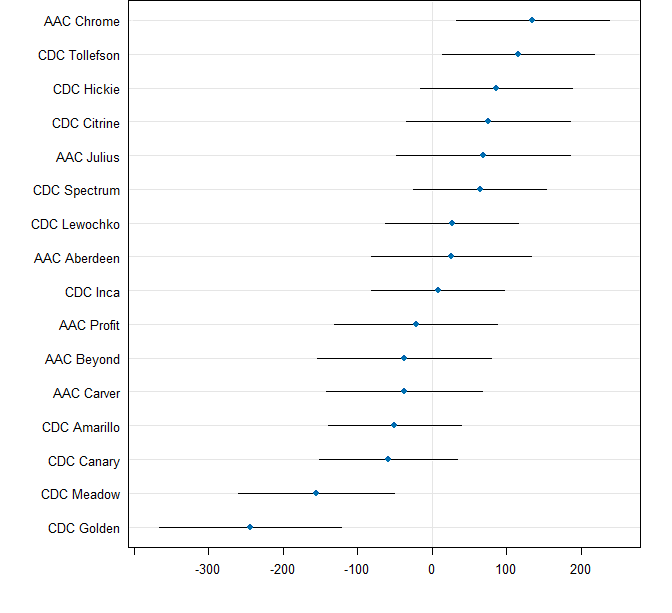
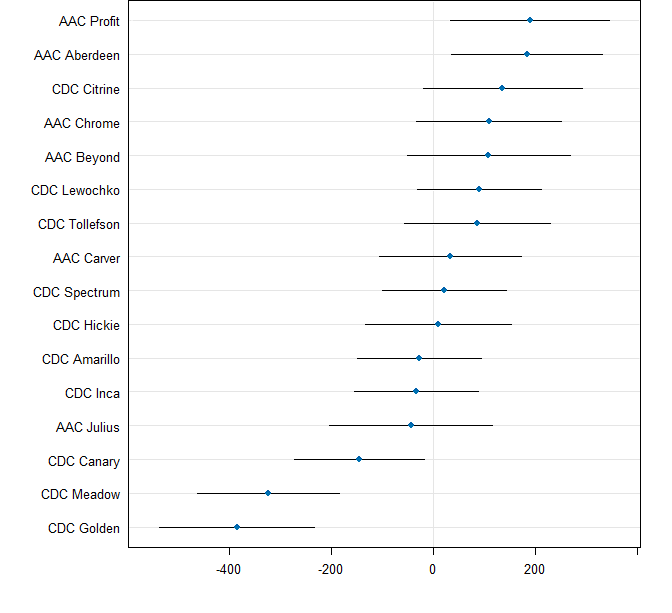
Figure 1. Relative yield ranking of yellow pea varieties from 8 years of RVT data in SK in the south (left) and north (right).

